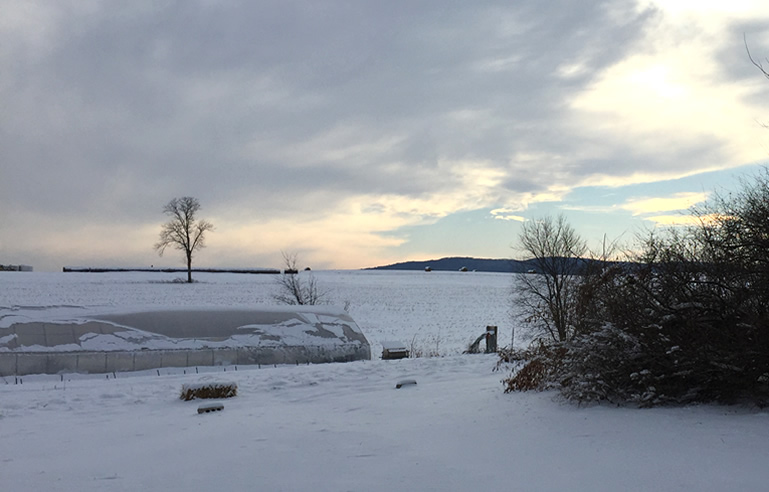“When we are attentive to our actions we are not prisoners to our habits; we do not need to do something today simply because we did it yesterday. Instead there is the possibility of considering our actions fresh and so avoiding thoughtless repetition.”
…TKV Desikachar

As we move toward the winter solstice, we can bring our awareness to the messages of the coming season. The deciduous trees have let go of their leaves so they can husband their life-sustaining resources. Most perennial plants have died back to the ground in a time of dormancy. Ground hogs, rabbits, and chipmunks hibernate or reduce activity to conserve their heat, food, and water. We, humans, dress warmly to go outside, heat our homes, nourish ourselves with warming, heavier foods, and perhaps rest and sleep longer encouraged by the increasing hours of darkness. Warmth and energy are to be conserved this time of year, whether you are a maple, a lily, a groundhog, or a person.
Along with the cold that all life must pay attention to in winter, there is also a stillness that can feel quiet and reflective. This quiet energy calls to that same energy within each of us. That is why I look forward to winter. It is a time of reflection.
As TKV Desikachar’s quote above reminds us, it is easy to slide into activities that we perform out of habit. They may be things we think about as “being what I have always done.” Or we may think that they are things expected of us, so we just do them. Yet, our days can become filled with activities whose usefulness and appropriateness to our time of life has faded. Or, they may be activities that have become so habitual that we do them mindlessly, so at the end of a day, it may be hard to recall where we have spent out time.
The quiet space winter offers can be a call to reflect upon “our actions.” We can examine what may have become part of our life just out of habit. We can ask ourselves what activities or commitments may no longer serve us or fit our stage of life? What changes might we make to live more intentionally and in keeping with what is most important to us?
Dharma is a concept in yoga that refers to personal responsibilities. Thinking about our dharma means to be aware of our own unique nature, our roles, duties and responsibilities to ourselves and society. For example, I have the dharma of a teacher. I also have the dharma of a wife, a mother, and grandmother. In terms of societal dharma, I have the dharma of a citizen in a representative democracy. For me, I need to look at what these mean in my life as a woman of 70 years. What are my responsibilities, and what are the actions/activities I want to have in my life? How do I balance these responsibilities?
The answer, according to my teacher Fran Ubertini, to whether we are on the right track is how we feel. We know we are in the right dharma because our “heart is content.” We are acting from a calm and focused mind.
Yes, I look forward to winter. I see it as a gift, providing space to reflect on the choices I am making. It is an opportunity to apply Desikachar’s advice to my actions and activities “fresh” and consider whether they are in keeping with my dharma. Winter may look like a fallow time, but it also may be an opportunity to plant seeds that will grow and blossom.
Thanks, Elizabeth. As so often, you offer an invitation to a new awareness that has no judgment. You invited me to look at making changes from a new perspective.
In your lovely sentence on the deciduous trees, I became aware that no energy is lost or spent in nature.The energy is merely channeled into another domain by change.
The whole blog prompted me to look at my choices at this particular time of life and of this season. It gave me reasons to be reflective and attentive to my dharma. Your writing is a blessing to me.
I wish you well in your winter reflections, Ruth. And, I thank you for the many blessings that have come to me from the sharing of your writing and voice.